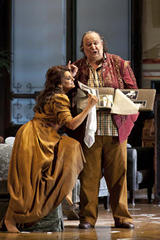| Opera Reviews | 20 April 2024 |
Ambrogio Maestri dominates as Falstaffby Moore Parker |
|
| Verdi: Falstaff Salzburg Festival 7 August 2013 |
|
|
Here Falstaff is granted no laundry chest, nor a cooling dip in the Thames - but rather a gigantic cotton sheet as a hide-out and shower of glitzy blue tinsel as his reward when discovered. The stage is filled with declining residents, filling their time with a game of cards or occasionally rolling between tables in their wheelchairs. The leads may appear through a window, or be lifted to action via a stage trapdoor. Pulsating walls and a swinging chandelier lend atmosphere, and videos of today's traffic roaring past Milan's illustrious retirement home set the scene together with a plaintive piano prelude forcing Verdi's brisk opening chords to play second fiddle. The idea of utilizing the institution which Verdi founded for ageing artists is quirky and generally innocuous, but casts something of a grey shadow against which the score and protagonists are pitted. The somewhat oppressive interaction within - and between - the male and female teams, the placement of Nanetta and Fenton's duet behind an ageing, reminiscing couple (possibly touching - but robbing young romance of its thrill and Verdi of his magical moment), and Falstaff's emasculated entrances on a rolling sofa are examples of a curtailment which deprive the artists and the work of potential impact and effervescence. Ultimately the success of this production rests on the shoulders of its leading protagonist, coupled with the forces in the pit. Ambrogio Maestri's Falstaff is no less than monumental, ranking with Gobbi, Evans and Taddei (who all remain etched upon the writer's memory). Possibly now at the height of his powers, Maestri sails through his part creating a kaleidoscopic character whose every nuance (both in gesture and word) ring true. However this larger-than-life portrayal rather bursts the seams of the available framework, making one wish for a grander setting and more appropriate foils to balance the act. On this evening, the remaining cast generally fared better on the male side with a motley mixture of characters who tended to outshine their female counterparts in accuracy and personality. Luca Casalin (Doctor Caius), Gianluca Sorrentino (Bardolfo), and Davide Fersini (Pistola) were well grouped and vocally matched. Javier Camarena's Fenton was something of an odd pearl in the chain - unusually voluptuous in tone, and leaning in timbre (and occasionally in style) more toward Puccini's Rinuccio or Rodolfo - and showing undoubted potential for such mainstream romantic leads. Massimo Cavaletti's Ford was solid, but somewhat lacking in impact. Nannetta (Eleonora Buratto) generally paralleled her lover in volume and produced some lovely effects - while not always enjoying an ideal vocal lightness in approach, and with her diction regrettably belying the fact that she was singing in her mother tongue. Fiorenza Cedolins' Alice was disappointingly uneven in production and rather lacklustre in presence. Meg Page is undoubtedly the least imposing of the Merry Wives, and despite Stephanie Houtzeel's valiant efforts, seemed even less vital in this somewhat pea-soup setting. In contrast, Elisabeth Kulman was given a well considered entrance as a white-clad nurse - and temptress - with two silver servers (each containing opulent gateaux to respectively represent Alice and Meg). Kulman evidently has fun with the part and is in possession of all the notes, if not quite the amusingly-fruity timbre which is quintessential for this kind of stage animal. Zubin Mehta achieved an admirable balance between the general cast and Maestri's exceptional vocal abilities, never giving the impression of any deficit while allowing extended rein when appropriate to produce true moments of grandeur, if not the quite the transparency achieved by certain predecessors in the pit. The Vienna Philharmonic was in superb form, always providing aural sparkle to compensate for any visual shortcomings. |
|
| Text ©
Moore Parker Photo © Silvia Lelli |

 Shrink-wrapped
might be the term for this Damiano Michieletto reading - the first of
the two new Verdi stage productions at the Festival in this anniversary
year. The approach is intimate with a single-set design (a salon in
Casa Verdi) which unyieldingly remains throughout, and with only a simple
plethora of potted palms for visual relief in Act 3.
Shrink-wrapped
might be the term for this Damiano Michieletto reading - the first of
the two new Verdi stage productions at the Festival in this anniversary
year. The approach is intimate with a single-set design (a salon in
Casa Verdi) which unyieldingly remains throughout, and with only a simple
plethora of potted palms for visual relief in Act 3. 





